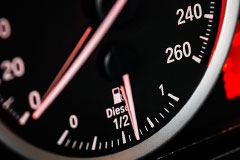How to Measure Your Average Gas Mileage - Vol.367
Every driver is concerned with how much gas they're going to use - after all, a significant part of our monthly budget goes towards paying gas for our cars. So, unless you're super wealthy and have your own personal driver, you probably want to make sure that your car gets good gas mileage. But how to measure it?

If you own a car that has more advanced electronics in it, you can easily find out the gas mileage by checking the dashboard. The trip computer will tell you the average MPG, or miles per gallon, so you can easily track your fuel consumption. Depending on the particular vehicle, and how sophisticated your trip computer is, the MPG information will change more quickly or slowly, and reflect the driving style you're using. Obviously, if you like to drive fast, or if you're stuck in a busy city most of the time, your MPG will be worse. On the other hand, by carefully driving on a moderately busy highway, your MPG will soar, and you'll see some real savings.
However, you don't necessarily have to rely on fancy computer technology to find out what the MPG of your car is. Just by using some good old math, you can easily calculate the average gas mileage, and with pretty great accuracy. Don't be intimated by math - it's really easy, and it might make you be more appreciative of saving gas.
The first thing you need to do when calculating MPG is to write down your car's odometer reading. More specifically, how many miles it has traveled so far. Note: you should do this on a full tank. Once it's time for refueling, you should then fill up the tank all the way up again, and this time measure how many gallons it needed for it to be completely full. Also, another piece is information you need this time is the new odometer reading.
Ok, now it's time for math. First, subtract the new odometer reading with the reading you did in the first step. That should give you the number of miles you have traveled. All you have to do now is to divide that number by the number of gallons it took to fill up the tank, and you should have the information about the miles per gallon.
Of course, doing this just once will give you the MPG information for that one situation. If you're feeling particularly adventurous, you can compare MPGs in different weather situations, different driving conditions, and styles, and that will really give you a more objective insight into what your real average gas mileage is.
An alternative way for this calculation would be to use the trip odometer of your car. Once you've filled up your car's tank, you should reset the trip odometer, in order to get the most accurate results. Once you've driven a while, and it's time to refuel, just like in the previous method, you should write down the number of gallons it took to refill the tank. Additionally, you should write down the number of miles that you've travelled, as shown by the trip odometer of your car. Then just simply divide the number of miles with the number of gallons, and you'll have your gas mileage information.
And there you have it - couple of easy ways to calculate your average gas mileage. If you haven't done any of this before, you ought to. You'd be surprised how fuel consumption can change, and it may affect you into driving more carefully, and perhaps spending less money on gas in the long run.